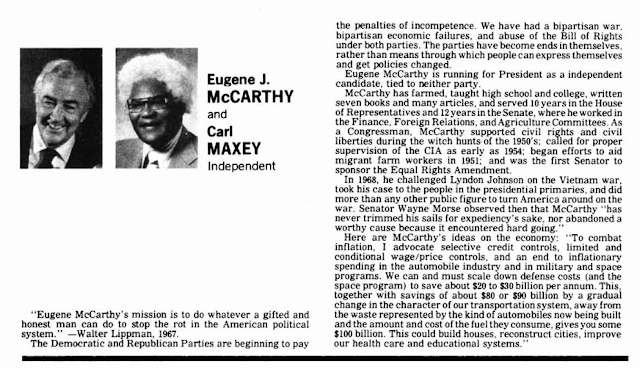Sunday, December 1, 2019
Carl Maxey
Carl Maxey, June 23, 1924 (Tacoma, Wash.) - July 17, 1997 (Spokane, Wash.)
VP candidate for Independent (1976)
Running mate with nominee: Eugene McCarthy (1916-2005)
Popular vote: 36,986 (0.05%)
Electoral vote: 0/538
The campaign:
After US Sen. Eugene McCarthy (D-MN) failed to secure the Democratic Party's nomination for President in 1968, a number of his followers campaigned for him as a third party candidate. McCarthy himself did not approve and in many but not all cases was able to have his name removed from the ballot. Different states ran his name under various party names with a variety of running mates, some of whom who were also not too thrilled to be listed: Coretta Scott King, Paul Newman, Dick Gregory, Paul O'Dwyer, and John Lindsay.
McCarthy made a brief foray into the Democratic Party primaries of 1972 but did not generate a lot of excitement. At some point after he dropped out of the race he left the Party, declared himself an Independent, and began a political journey to what could be described as libertarian centrism. As an Independent Presidential candidate in 1976 he is frequently better remembered for his high-profile legal battles to gain ballot access for third parties than for his political platform.
His 1976 VP situation made 1968 look tame. He was on the ballot in 29 states and a registered write-in in a few others. He had over 20 running mates. McCarthy himself said, "Vice-presidential candidates just clutter up the campaign. We should not ask the country to make two judgments. Everyone knows vice presidents have no influence on presidents once elected. Presidents' wives have much more influence. Perhaps we should have candidates' wives debate."
McCarthy's running-mate in Washington State was Carl Maxey of Spokane. He had been part of McCarthy's 1968 campaign in Washington. They were on the ballot under the Independent label.
Although none of McCarthy's state-by-state stand-in VP candidates were national household names, Carl Maxey perhaps came the closest to that distinction. No stranger to headlines, he was the only one of McCarthy's 1976 running-mates to have ever waged a state-wide campaign for public office when he ran for the US Senate in 1970. By 1976 Maxey had become an icon in Washington State politics, a hero to many, a thorn in the side for others. It is intriguing that Maxey generally approached public policy from the Left even though he was based in the more politically conservative region of the state.
McCarthy/Maxey won 2.38% of the vote in the Evergreen State, McCarthy's 5th strongest showing. Nationally McCarthy won 0.91% of the popular poll.
Election history:
1970 - US Senate (Wash.) (Democratic) - primary - defeated
Other occupations: boxer, soldier (WWII), attorney, civil rights and antiwar activist
Buried: Spokane Memorial Gardens (Spokane, Wash.)
Notes:
The winner of the 1970 race was Henry "Scoop" Jackson
Defended the Seattle Seven, a group Jeffrey Lewbowski claimed he was part of in The Big Lebowski.
Raised partly in an orphanage in Spokane (he was kicked out simply due to being African-American)
and partly at an Indian mission school at the Sacred Heart Mission in DeSmet, Idaho
Ended his life with a self-inflicted gunshot on the eve of his retirement.
Was known as "King Carl" in his boxing career
"The whole damn country is a bunch of Archie Bunkers."--Carl Maxey
Worked on Jesse Jackson's campaign in 1988




